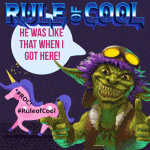How To Handle Character Death From A GM’s Point Of View
Posted by Rick Heinz on
GM Tips, hosted by the talented veteran Game Master Satine Phoenix, is our show to help Dungeon Masters and Game Masters improve their craft and create memorable roleplaying experiences. Last week, we talked about education through gaming, but as all things must come to an end, this week is all about character death.
Dr. Megan Connell brings her wisdom (and serious educational background) on GM Tips with Satine Phoenix and talks about boundaries, emotions and running the game. Before we get into character death, it’s important that you understand boundaries as a GM, so get caught up below.
There is nothing that I can add to the discussion about empowerment or character boundaries that aren’t covered above, but there’s plenty to discuss in terms of character death from a Storyteller’s point of view.
Why Death Is More Than A Sheet
A phrase often repeated at LARP’s and sometimes at the table is: “It’s just a character sheet.” This phrase, meant to remind the player that it’s just a collection of stats, is one of most garbage pieces of advice ever. Here are the logistics: The storyteller spent a time either helping build that character, approving it, writing the back-story, creating plot, building NPCs, fostering its place in the world, and perhaps even entire towns where that character came from. Losing a character often creates a ton of work for the storyteller, not to mention the feeling of loss progress from the player. That is what the sheet has tracked—progress.
So if a character dies, and it’s not a competitive game, don’t penalize your players with less experience or lower level. Just, let them build up a new person at the same stats. I know the fear that players won’t care about death but have a little faith in them that they will play fair (I mean, you trust them not to fudge their die rolls already, right?)
How To Make Character Death Matter
So a PC has bit the bullet. Either from PVP, a failed saving through, or a lousy botched Juicer auto dodge roll (You had one job Rifts!!) but in the end you’ve got worm food. So how do you take this death and weave it into the story? Is your party slagged? Are players pissed off? Here’s what you can do: have the world react until the end of the campaign. Someone’s favorite paladin died? When they walk into towns have wreaths in his honor on the door. Have an actual in-game funeral, and then, have the next adventure or plot point be because that player had died.
If player characters are meant to be the heroes of the story, then their death leaves a void to fill. One that NPCs, monsters or other things may very well try to capitalize on. With the dead paladin example above, maybe his starting village is under assault by goblins the party beat ages ago. Or perhaps his family is now under target from a rogues guild. Showing the player just how much their character meant in the world will make the death have even more impact and potentially pave the way to…
It’s a Game People: Respawn.
Unless you are running some one-shot murder hobo horror game or some ultra-realistic game setting, death doesn’t need to be the end. Particularly in far fantasy settings or far future settings with cloning. In fact, GMing for Eclipse Phase has been one of the most freeing storyteller experiences I have ever had. It’s changed all my games forever. I’ve reached PC Death Enlightenment.
The moment you realize you can kill your PC’s and still have them keep playing it, the story becomes about the situation. The story becomes about that they are trying to save or achieve rather than the dots on their sheet. If an entire party gets wiped out, we don’t have to wait for a cleric to heal them all, continue the game in the afterlife in Purgatory! Or even in future settings, their clone suddenly wakes up with the past day erased from their mind… and the next adventure is on.
Take a step back and a storyteller and ask yourself: is your goal to kill your PCs? Or is your goal to have them on the edge of their seats. If the latter… stop writing adventures based on their survival and let them die—and continue.
How is character death handled at your table? Let us know in the comments below!
Looking for More Useful GM Tips?
- Learn more about how Eclipse Phase is the Altered Carbon RPG resleeved.
- Master the use of house rules with these GM Tips.
- Shop the Geek & Sundry store for DM gear, like a “Chronicles of Exandria” Art book!
Featured Image: Wizards of the Coast, Curse of Strahd by Jedd Chevrier
Rick Heinz is the author of The Seventh Age: Dawn, and a storyteller with a focus on LARPs, Wraith: The Oblivion, Eclipse Phase, and many more. You can follow game or urban fantasy related thingies on Twitter or Facebook.
On – 26 Feb, 2018 By Rick Heinz






